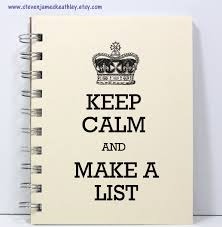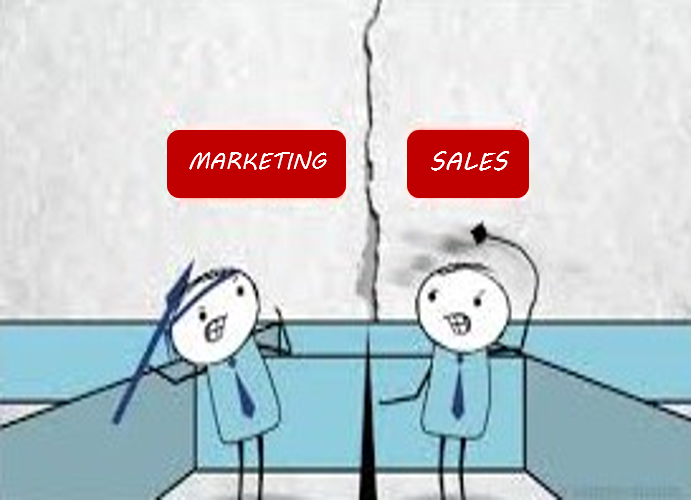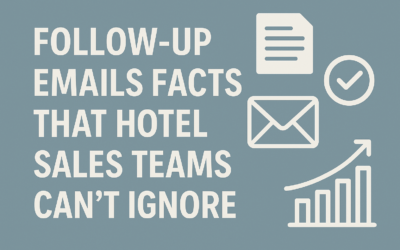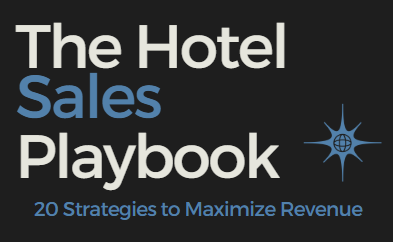Five differences between sales and marketing that are reduced by sales acceleration tehchnologies
Sep 30, 2015 | 4 min read
I love doing lists. All kinds of lists: I write lists for grocery shopping and event invites. I list things I need to get done as well as all the celebrities I would like to date, etc. etc.
So, naturally, for my very first blog post I chose to make a list of the top five differences between sales and marketing teams in the hotel industry that sometimes make working together a struggle.
These five points stem from observations I made working in the hospitality industry. Ultimately I hope this will help to identify what can be done to improve the at times tricky work situation between sales and marketing.
Let’s start with some striking figures that prove how the alignment between these two departments is important to the performance of any organization: When sales and marketing teams are in sync, companies become up to 67 percent better at closing deals (1). In the same vein, the alignment of sales and marketing leads to a threefold increase in revenue growth (2).
But despite this only 30 percent of CMOs have a clear process in place to make marketing and sales alignment a priority (3).
According to the Qvidian, 88 percent of missed sales opportunities occurred because sales couldn’t find or leverage internal resources (including marketing resources). This is especially true for the hotel industry, where we are usually dealing with a centralized marketing team and a decentralized sales team – a structure that is just not ideal for a good integration.
But apart from this purely organizational issue, the main reason why the sync is so difficult is because sales and marketing ARE very different, both regarding the very nature of their job and their use of technology:
1. They have different profiles and different roles
Marketers work on wide strategies. They are in charge of ensuring the quality of the guests’ experience. They are responsible for generating revenue through marketing initiatives, for growing existing contacts, and for the improvement of their hotels’ performance in the market place. They manage and develop the marketing plan, set up and deliver communications and campaigns across all platforms, deliver strategic communication plans, etc. This is a very wide range of responsibilities, not all of which are linked directly to the area of sales. They are driven by data and creativity and focus mainly on mid- to long-term results.
By contrast, salespeople love direct and personal customer contact and prefer one-to-one relationships with actual persons, not only with a name on a database. They are responsible for the success of a deal from the prospecting to the closing stage and sometimes manage the client relationships that follow after that. They deal with fewer contacts but focus on the quality of exchanges to transform a mere lead into a client. They manage their own business development strategy on a daily basis. They are driven by results and human interactions and need to keep their eyes on short term success.
2. They use different tools
While marketing tools are well known and widely implemented within most organizations, with the exception of CRM there are not many tools that are used by sales teams. Sales technologies are just not widely adopted, whereas most marketing tasks can be automated with tools that are designed to address and monitor massive amounts of contacts all at once. For sales, process automation is not as easy – the human dimension that is key to their work is much harder to reflect accurately in tech solutions. To put it simply, marketing couldn’t work without automation tools while sales teams, despite the various sales acceleration tools available on the market and used in other industries, work with nothing but a CRM, a mailbox, a calendar, and a phone.
3. They write emails to prospects differently
For marketing, the objective is to target a whole market. Thus, the communication they use is comparatively standardized. With improvements made in segmenting and tailoring marketing messages, they can be quite specific to a given group of prospects, but the message itself still needs to fit the largest possible number of potential clients.
The salesperson’s first job then is to sort out the subsequent leads so as to be able to focus on the most relevant ones. As a general rule, every deal in the hotel business that involves a salesperson is a high value deal. This is why the importance to address each contact individually and with high quality, even if we are still at the prospecting stage, cannot be overestimated. As this is a more personal communication, you need to really do your research and put more effort in than to just send one email.
To put it in a nutshell, marketing addresses the same content to thousands of people while sales send a different content to each of the hundreds of persons they deal with.
4. They don’t have the same taste for technology
Because of the nature of their work, marketing has been driven by technology for several years now; in the hotel industry, marketing team members and managers are dealing with concepts such as SEO, SMO, OTAs, website administration, and many more on a daily basis. They look at metrics like click per view, manage several channels, and deal with digital content of various formats, all in a day’s work. Working with tasks automation tools is the normal way to do things.
Salespeople, on the other hand, do not tend to deal with technologies as much. They use CRM as users, and not administrators. They need a large amount of information to do their job properly, but the main tools they use are their organizational skills, their perseverance, their ability to understand a client’s needs and their salesmanship.
The problem is then that sometimes marketing and sales don’t speak the same language.
5. They have the same goal but different concerns
Of course both marketing and sales have the same ultimate goal: to increase the revenue of their company. But as we have seen here, the roles of marketing and sales teams in the process of achieving this goal are very different. One reflection of that is that on a day-to-day basis they have different concerns. While marketing is concerned about how many people will open and click on emails so that they can evaluate the performance of a campaign, sales people are concerned about booking appointments to fill their opportunity pipeline. When marketing is dealing with a long-term, global digital strategy, sales are concerned with following up every open deal in order to reach their targets.
So the question remains: How can we make these key departments work together more efficiently? Basically, the idea is not to fight these differences, which are inherent to both departments, but to find ways to improve the teamwork between them.
Although there should also be managerial incentives to bring the teams closer, there already exist tools that make this job easier.
How? For example, by automatically recommending the best content available for each recipient at every stage of the sales process, by providing statistics for sales and marketing to truly understand what engage their prospects and by minimising sales team effort to enter data in their CRM.
One tool I want to put in the spotlight here is UpMail, which was developed to increase sales productivity and to improve the integration of sales and marketing. UpMail has been designed especially for hospitality groups and comes with a high level of service.
Take a look at the UpMail website here.
See you next month!
Nacerine
(1) Source: Marketo, http://typeacommunications.com/50-statistics-b2b-sales-marketing-misalignment/
(2) Source: Bulldog Solutions
(3) Source: CMO Council
—
Based in London, UK, UpMail is an email tool for hotel sales people to increase one-to-one email communications productivity and sales conversion rates. UpMail customers includes Jurys Inn, Iberostar, citizenM, and many more.
Read also from our blog
Follow-Up Email Facts That Hotel Sales Teams Can’t Ignore
Most hotel sales opportunities are lost not because of the offer—but because of a lack of follow-up. Let’s break down five facts that reveal just how crucial follow-ups are in both the prospecting and proposal stages of hotel sales.
The Hotel Sales Playbook: 20 Strategies to Maximize Revenue
Maximizing revenue in hotel sales requires a strategic approach to guestroom occupancy, upselling, and targeted promotions. By leveraging data from past inquiries and bookings, hotel sales teams can craft compelling offers that drive new business and maximize profitability. Here are 20 key strategies to help you increase revenue and optimize sales performance:
Give Your Hotel Sales Proposals an Edge with Unique, High-Impact Content
When it comes to hotel sales proposals, first impressions matter. A well-crafted proposal should do more than just present rates, dates and availability—it should tell a compelling story that resonates with your potential clients. Here are some key elements to consider including in your next hotel sales proposal to give it an edge.








